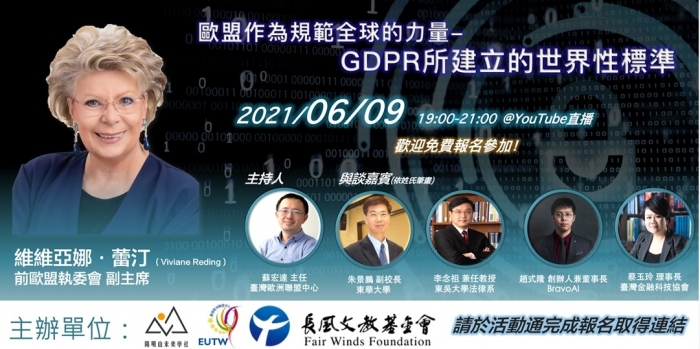In response to the strong interest from domestic industry, government, and academia in issues surrounding the European Union’s implementation of the General Data Protection Regulation (GDPR), the European Union Centre in Taiwan (EUTW), in collaboration with the Taiwan Future Society and the Fairwinds Foundation, invited former European Commission Vice President Viviane Reding to speak online on June 9th. She explored how the EU has established a robust legal foundation for data usage and digital human rights and examined its global impact on data rights, especially regarding the "right to be forgotten." The online lecture and discussion were moderated by Professor Hung-dah Su, Director of EUTW and EU Jean Monnet Chair at National Taiwan University.
The lecture titled "The EU as a Global Regulatory Power: The Worldwide Standard Set by GDPR" was changed to a YouTube livestream due to The Level 3 alert for COVID-19. On the day of the event, it attracted a peak of over 300 concurrent viewers, demonstrating the wide interest in this topic across various sectors. Dr. Su Hung-dah, Director of the EUTW, and Dr. Kuang-Shih Yeh, President of the Taiwan Future Society, representing all the organizers, gave opening remarks and introduced the speaker, former European Commission Vice President Viviane Reding, officially commencing the lecture.
Ms. Reding began by explaining the background of the EU's formulation of the GDPR. In the face of rapid digital technology development, the main consideration in drafting the regulation was how to maintain a balance between technological innovation and human rights protection. With the rise of emerging technologies, the European Commission recognized that EU-level legislation was a necessary foundation for concretely implementing human rights protection in member states. However, during the legislative process, multinational corporations and even member states themselves, concerned about potential obstacles to their interests, continuously attempted to hinder the legislative progress through political lobbying and amendments. Despite the arduous process, the European Parliament ultimately passed the legislation.
This lecture specially invited Professor Ching-Peng Chu, Vice President of National Dong Hwa University and EU Jean Monnet Chair; Attorney Nien-Tsu Li, Adjunct Professor at Soochow University School of Law; Jaclyn Tsai, Chairperson of the Taiwan Fintech Association; and Shih-Lung Chao, Founder and Chairman of BravoAI. They were asked to analyze the impact of the EU's General Data Protection Regulation (GDPR) from the perspectives of EU governance, legal practice, financial industry, and business operations, respectively.
After the lecture, questions focused on how the EU handles conflicts between values and policies in external relations, the practical application and effectiveness of GDPR in both public and private sectors, and the substantial impact of the "right to be forgotten." These discussions provided participants with a deeper understanding of the current status, concrete developments, and impacts of the EU's implementation of GDPR.
The European Union Centre in Taiwan (EUTW) is a "consortium university led by National Taiwan University" established through agreements between National Taiwan University and six other universities: National Chengchi University, National Chung Hsing University, National Sun Yat-sen University, National Dong Hwa University, Fu Jen Catholic University, and Tamkang University. It also serves as an exchange platform established through an agreement with the European Union.
Although the names of such centers in various countries may differ slightly, they are all officially commissioned by the EU to serve as mechanisms for social and academic exchange and cooperation between their respective countries and the EU. These centers are interconnected, forming a global and regional community for EU studies.
For more information about the Center's activities, please visit the Center's website at http://www.eutw.org.tw.


Social links